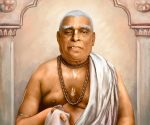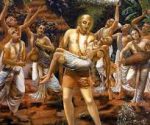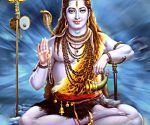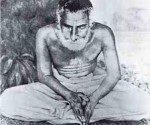How to Honor Prasadam
Please accept our humble obeisance. All glories to Sri Guru and Gauranga.
For most of us, some of the main activities of our day are in relation to krsna-prasada – purchasing foodstuffs from the market, cooking them, offering them to Krsna, and then honoring the prasada. Prasada is important to us.
We pray that you will relish the following eye-opening, never-before-published darsanas of Srila Gurudeva, Sri Srimad Bhaktivedanta Narayana Gosvami Maharaja, on the subject of prasada.
Don’t Eat Prasada
Springfield, Virginia: 1999
We should have more faith in the holy names of Krsna than in money and wealth. Then, quickly, Nama Prabhu (Krsna’s holy names) will be merciful to us. Generally, devotees chant without faith that the holy name can give them everything. Please realize this; Krsna’s names can give anything. So, chant with great love, and with a sense of having the relation with Krsna that I have explained to you. Don’t ‘chant;’ rather ‘serve.’ Do you eat prasadam? Never ‘eat.’ To consider that we are ‘eating’ prasadam is an offense. Can you eat Krsna? Similarly, don’t ‘chant’ or ‘utter’ harinama. Rather, serve harinama.
Don’t consider that you are ‘hearing’ hari-katha, because your mortal ears cannot hear transcendental words. Rather, we should try to serve hari-katha, which is actually the pastimes of Krsna, thinking, “I want to serve Him.”
When you are going to see the Deities, do not consider that you are seeing Them. We actually never see Them; we cannot see Them. We cannot take darsana. We should simply stand in front of Them and pray, “O, You are so merciful. Please give one glance to us. How fallen we are that we cannot even take Your darsana.” We should have this mood of serving. If you consider, “I’m seeing,” then you are the doer; and if you are serving, then Krsna is the doer. We should always have this mood.
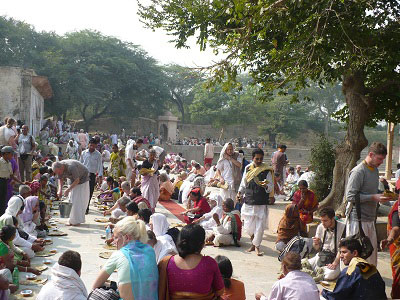
How to Honor and Serve Prasadam
(Vrndavana, February,1995)
Syamarani dasi: You said that everything we do is service; so how can we further develop the attitude of service while taking maha-prasadam instead of trying to enjoy it?
Srila Gurudeva: When you take caranamrtam, you don’t consider whether it is sweet or not; you simply take it. Similarly, try to serve prasadam as Sri Vigraha (Thakuraji, the Deity). We ‘serve’ caranamrtam, we ‘serve’ tulasi leaves offered to Krsna. We don’t consider the taste of tulasi; we take the tulsi leaves as service.
maha prasade govinde
nama brahmani vaisnave
svalpa punyavatam rajan
visvaso naiva jayate
Maha-prasada is Krsna. Everything of Krsna is like Krsna, so we should try to serve maha-prasada. We pray, “O maha-prasada, please give us your mercy so that we can understand you and realize you; so that we can serve you; so that all worldly desires will go away; and so that krsna-prema will manifest in our hearts.”
This is the speciality of maha-prasada; it gives krsna-prema. Krsna-nama, pure brahmanas, and pure Vaisnavas are all non-different from Krsna Himself. Nama (the holy name) and Nami (Krsna, the possessor of His name) are the same. “Svalpa punyavatam rajan, visvaso naiva jayate.” Those who have actually served Krsna, Gurudeva, and Vaisnavas can realize all this.
We should pray in this way, and not consider the taste at all; do only this. When we see Gurudeva, we know that he is a manifestation of Krsna. He is both a servant of Krsna and Krsna’s manifestation. Similarly, prasada is also non-different from Krsna, and we pray to prasada to be merciful to us.
The Glories of Prasada
Excerpts of Darsanas on Sri Vilapa-kusumanjali, Texts 47-49
Vrndavana/Mathura: December 1991, and January 1992
[In Srila Narayana Gosvami Maharaja’s discourses below, he goes back and forth between saying that (a) certain pastimes of Tulasi (Rati) Manjari serving Srimati Radhika had already taken place, and (b) saying that Srila Raghunatha dasa Gosvami in the mood of Tulasi Manjari is praying for those services. This is because both are true. In Raghunatha dasa Gosvami’s external consciousness (bahir dasa) he is praying with a feeling of great separation and a desire for service, and when he is in his internal consciousness, he forgets that he is Raghunatha dasa Gosvami and is absorbed in his identity as Tulasi Manjari engaged in that service. We have only included those parts of the discourse wherein Srila Maharaja is speaking directly about the prasada seva. -ed]




